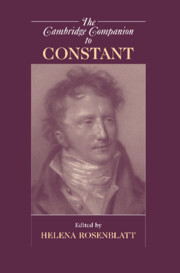Book contents
1 - Benjamin Constant: Life and Work
Published online by Cambridge University Press: 28 July 2009
Summary
A year before his death, Benjamin Constant confided to his readers in the preface to the Mélanges de littérature et de politique (1829):
For forty years I have defended the same principle: freedom in all things, in religion, philosophy, literature, industry and politics. And by freedom I mean the triumph of the individual both over an authority that would wish to govern by despotic means and over the masses who claim the right to make a minority subservient to a majority.
In this often-quoted statement lies the key to Constant’s literary and political success in his own age and his continuing relevance for our own. The period in which he lived - the end of the ancien régime, the Revolution and Terror, the Napoleonic Empire, and the Restoration - had frequently been inimical to personal freedom in France and elsewhere. It was Constant’s good fortune to have precisely the character, intellect, and pugnacity to be able to challenge this state of affairs untiringly, as well as to discern its source and potential for future misery. Reading Constant’s elegant prose, with its irony, pointed epigrams, and concision, one is often reminded of the Roman historian Tacitus. The parallel indeed does not end there, for in both writers there is an awareness of the opposing extremes of libertas and dominatio. Events in the world since Constant’s death in 1830 have only emphasized how perceptive Constant was to fear the growth of the omniscient and omnicompetent state and to champion the individual’s right to privacy.
- Type
- Chapter
- Information
- The Cambridge Companion to Constant , pp. 3 - 20Publisher: Cambridge University PressPrint publication year: 2009
- 2
- Cited by



